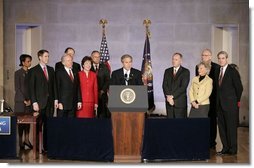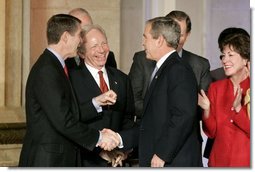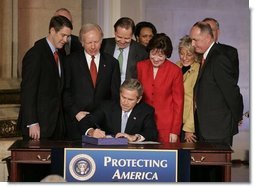
- Afghanistan
- Africa
- Budget Management
- Defense
- Economy
- Education
- Energy
- Environment
- Global Diplomacy
- Health Care
- Homeland Security
- Immigration
- International Trade
- Iraq
- Judicial Nominations
- Middle East
- National Security
- Veterans
|
Home >
News & Policies >
December 2004
|
For Immediate Release
Office of the Press Secretary
December 17, 2004
President Signs Intelligence Reform and Terrorism Prevention Act
Andrew W. Mellon Auditorium
Washington, D.C.
9:59 A.M. EST
THE PRESIDENT: Good morning. In a few minutes, I will sign into law the most dramatic reform of our nation's intelligence capabilities since President Harry S. Truman signed the National Security Act of 1947.
Under this new law, our vast intelligence enterprise will become more unified, coordinated and effective. It will enable us to better do our duty, which is to protect the American people.
 I want to thank the members of Congress who have worked hard on this legislation. I particularly want to thank the leader of the Senate, Bill Frist, Speaker of the House Denny Hastert, and their counterparts in both bodies. I appreciate Senator Susan Collins from Maine and Senator Joe Lieberman from Connecticut for steering this legislation through the United States Senate. I appreciate Congressman Pete Hoekstra and Congresswoman Jane Harman for their leadership on this important issue, as well. Welcome. (Applause.)
I want to thank the members of Congress who have worked hard on this legislation. I particularly want to thank the leader of the Senate, Bill Frist, Speaker of the House Denny Hastert, and their counterparts in both bodies. I appreciate Senator Susan Collins from Maine and Senator Joe Lieberman from Connecticut for steering this legislation through the United States Senate. I appreciate Congressman Pete Hoekstra and Congresswoman Jane Harman for their leadership on this important issue, as well. Welcome. (Applause.)
I want to thank all the members of Congress who have joined us today for your good work on this legislation. I appreciate the members of my administration who helped, and that would be Director Porter Goss, Director Bob Mueller, Condi Rice and Fran Townsend. I particularly want to thank the 9/11 Commission, ably led by Tom Kean and Lee Hamilton. I want to thank the commission members who are here, as well. (Applause.)
I pay my respects, and offer our gratitude, to the family members of the victims of September the 11th. Thank you for working hard on this issue. Thank you for remembering your loved one.
Nearly six decades ago, our nation and our allies faced a new -- the new world of the Cold War and the dangers of a new enemy. To defend the free world from an armed empire bent on conquest, visionary leaders created new institutions such as the NATO alliance. The NATO alliance was begun by treaty in this very room. President Truman also implemented a sweeping reorganization of the federal government. He established the Department of Defense, the Central Intelligence Agency, and the National Security Council.
America, in this new century, again faces new threats. Instead of massed armies, we face stateless networks; we face killers who hide in our own cities. We must confront deadly technologies. To inflict great harm on our country, America's enemies need to be only right once. Our intelligence and law enforcement professionals in our government must be right every single time. Our government is adapting to confront and defeat these threats. We're staying on the offensive against the enemy. We'll take the fight to the terrorists abroad so we do not have to face them here at home.
 And here at home, we're strengthening our homeland defenses. We created the Department of Homeland Security. We have made the prevention of terror attacks the highest priority of the Department of Justice and the FBI. We'll continue to work with Congress to make sure they've got the resources necessary to do their jobs. We established the National Counterterrorism Center where all the available intelligence on terrorist threats is brought together in one place and where joint action against the terrorists is planned.
And here at home, we're strengthening our homeland defenses. We created the Department of Homeland Security. We have made the prevention of terror attacks the highest priority of the Department of Justice and the FBI. We'll continue to work with Congress to make sure they've got the resources necessary to do their jobs. We established the National Counterterrorism Center where all the available intelligence on terrorist threats is brought together in one place and where joint action against the terrorists is planned.
We have strengthened the security of our nation's borders and ports of entry and transportation systems. The bill I sign today continues the essential reorganization of our government. Those charged with protecting America must have the best possible intelligence information, and that information must be closely integrated to form the clearest possible picture of the threats to our country.
A key lesson of September the 11th, 2001 is that America's intelligence agencies must work together as a single, unified enterprise. The Intelligence Reform and Terrorism Prevention Act of 2004 creates the position of Director of National Intelligence, or DNI, to be appointed by the President with the consent of the Senate.
The Director will lead a unified intelligence community and will serve as the principal advisor to the President on intelligence matters. The DNI will have the authority to order the collection of new intelligence, to ensure the sharing of information among agencies and to establish common standards for the intelligence community's personnel. It will be the DNI's responsibility to determine the annual budgets for all national intelligence agencies and offices and to direct how these funds are spent. These authorities vested in a single official who reports directly to me will make all our intelligence efforts better coordinated, more efficient, and more effective.
The Director of the CIA will report to the DNI. The CIA will retain its core of responsibilities for collecting human intelligence, analyzing intelligence from all sources, and supporting American interests abroad at the direction of the President.
The new law will preserve the existing chain of command and leave all our intelligence agencies, organizations, and offices in their current departments. Our military commanders will continue to have quick access to the intelligence they need to achieve victory on the battlefield. And the law supports our efforts to ensure greater information sharing among federal departments and agencies, and also with appropriate state and local authorities.
 The many reforms in this act have a single goal: to ensure that the people in government responsible for defending America have the best possible information to make the best possible decisions. The men and women of our intelligence community give America their very best every day, and in return we owe them our full support. As we continue to reform and strengthen the intelligence community, we will do all that is necessary to defend its people and the nation we serve.
The many reforms in this act have a single goal: to ensure that the people in government responsible for defending America have the best possible information to make the best possible decisions. The men and women of our intelligence community give America their very best every day, and in return we owe them our full support. As we continue to reform and strengthen the intelligence community, we will do all that is necessary to defend its people and the nation we serve.
I'm now pleased and honored to sign into law the Intelligence Reform and Terrorism Prevention Act of 2004. (Applause.)
(The bill is signed.) (Applause.)


